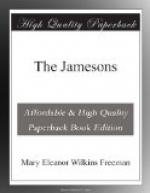The upshot of it was that the Grover stage-coach arrived, and Mrs. Sim White’s brother, Elijah M. Mills, and Mrs. Lucy Beers Wright, besides a number of others of lesser fame, were obliged to leave without raising their voices, or lose their trains, which for such busy people was not to be thought of. There was much subdued indignation and discomfiture among us, and I dare say among the guests themselves. Mrs. Lucy Beers Wright was particularly haughty, even to Mrs. Sim White, who did her best to express her regret without blaming Mrs. Jameson. As for Elijah M. Mills, Louisa said she heard him say something which she would not repeat, when he was putting on his hat. He is a fine speaker, and noted for the witty stories which he tells; we felt that we had missed a great deal. I must say, to do her justice, that Mrs. Jameson seemed somewhat perturbed, and disposed to be conciliating when she bade the guests good-by; she was even apologetic in her calmly superior way.
However, the guests had not been gone long before something happened to put it all out of our minds for the time. The Rev. Henry P. Jacobs had just stood up again, with a somewhat crestfallen air, to read his poem—I suppose he was disappointed to lose the more important part of his audience—when there was a little scream, and poor Harriet Jameson was all in a blaze. She wore a white muslin dress, and somehow it had caught—I suppose from a spark; she had been sitting near the hearth, though we had thought the fire was out. Harry Liscom made one spring for her when he saw what had happened; but he had not been very near her, and a woman was before him. She caught up the braided rug from the floor, and in a second Harriet was borne down under it, and then Harry was there with his coat, and Sim White, and the fire was out. Poor Harriet was not much hurt, only a few trifling burns; but if it had not been for the woman she might easily have gotten her death, and our centennial ended in a tragedy.
It had all been done so quickly that we had not fairly seen who the woman who snatched up the rug was, but when the fire was out we knew: Caroline Liscom. She was somewhat burned herself, too, but she did not seem to mind that at all. She was, to our utter surprise—for we all knew how she had felt about Harry’s marrying Harriet—cuddling the girl in her motherly arms, the sleeves of her best black grenadine being all scorched, too, and telling her that she must not be frightened, the fire was all out, and calling her my dear child, and kissing her. I, for one, never knew that Caroline Liscom could display so much warmth of love and pity, and that toward a girl whom she was determined her son should not marry, and before so many. I suppose when she saw the poor child all in a blaze, and thought she would be burned to death, her heart smote her, and she felt that she would do anything in the world if she only lived.
Harry Liscom was as white as a sheet. Once or twice he tried to push his mother away, as if he wished to do the comforting and cuddling himself; but she would not have it. “Poor child! poor child!” she kept repeating; “it’s all over, don’t be frightened,” as if Harriet had been a baby.




